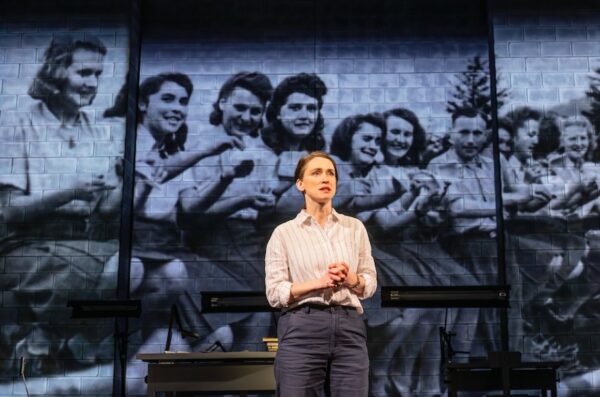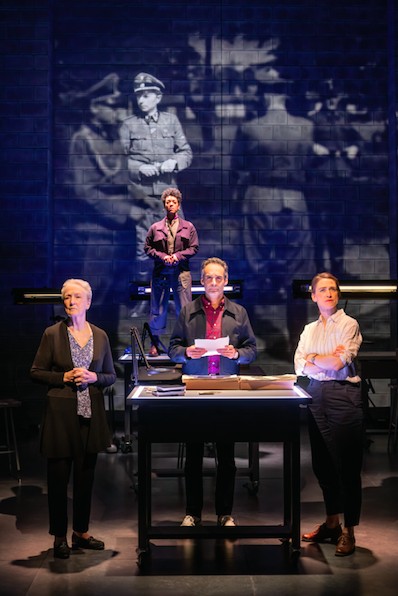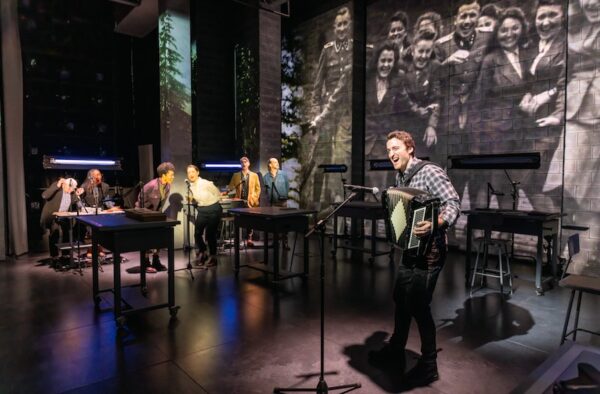The audience at the New York Theater Workshop is greeted with a camera on a stand positioned before a backdrop with a giant logo for Leica Cameras. Pleasant upbeat music from the 1930s and 40s plays in the background. After the lights have lowered, there is a drumroll, reminiscent of the one heard in the beginning of Cabaret (ominous foreshadowing) and two smiling actors enter to describe the revolution by Leica’s portable, affordable product. In the decades corresponding to the music photography, once the plaything of the elite, was available to the masses and everyday people could memorialize their outings and memorable occasions on celluloid. The actors inform us that Germany was at the forefront of this new, life-changing hobby. The curtains part and a series of black and white photos is projected on a giant screen. We see young people hiking in the woods, canoeing, and generally having a good time. Suddenly, the mood shifts as swatiskas begin appear on the arms of the subjects. And just like that, the horrors of the Holocaust are made ordinary and mundane.

Credit: Matthew Murphy
Thus begins Here There Are Blueberries, Moises Kaufman and Amanda Gronich’s searing and wrenching documentary play on the devastating effects an album of photos has on the way we think of the Nazi era. As Kaufman and his Tectonic Theater Project have done with The Laramie Project, his play on the murder of Matthew Shepherd, Blueberries employs real people and meticulously researched details to portray a shocking act of cruelty. The reality-based plot is set in motion when a retired American Intelligence officer sends the Holocaust Memorial Museum in Washington, DC, the album of photos taken at Auschwitz concentration camp which he found in a deserted house in Frankfurt in the early days after World War II. There were no starving or tortured prisoners. All of the pix showed the officers and staff at parties, outings, and even laughingly feasting on blueberries. The action details the museum’s researchers efforts to identify the participants and how much they knew of the atrocities committed under their noses.

Credit: Matthew Murphy
Like Jonathan Glazer’s recent Oscar-winning film, Zone of Interest, which focuses on the domestic doings of the Auschwitz Commandant and his family, Blueberries depicts the horrifying ordinariness of the Germans’ lives as unspeakable crimes were committed in their names. The people in the pictures don’t look like inhuman monsters and the researchers begin to wonder how they would have acted in their place. Kaufman’s subtle direction always the text to speak for itself as difficult questions are asked. Similarly, David Bengali’s projections provide ultimate impact, displaying the ordinariness of the Auschwitz staff in stark black and white. David Lander’s lighting and Derek McLane’s utilitarian set create the subdued, reflective atmosphere of a museum.

Credit: Matthew Murphy
The cast also underplays the roiling emotions elicited by the photos. As head researcher Rebecca Erbelding, Elizabeth Stahlman strongly pursues her objective of professional detachment, but allows her uncomfortable thoughts to slowly play across her expressive features. Then she delivers a shattering monologue as a Holocaust survivor who appears in a second album later found and depicting the degradation and devastation endured by the prisoners. Kathleen Chalfant is a reliable and compassionate guide to the investigation as Judy Cohen, director of the museum. Jonathan Raviv is touching as the grandson of a Nazi seeking to atone.
These actors and the rest of the able ensemble play multiple roles, sometimes bringing the photos to life, sometimes enacting the researchers probing reluctant witnesses to provide details. Thanks to them, Kaufman and Gronich, each moment of this Pulitzer Prize finalist play rings true—and that’s what’s so terrifying.
Here There Are Blueberries: May 13—June 30. New York Theater Workshop, 79 E. 4th St., NYC. Running time: 90 minutes with no intermission. nytw.org.
